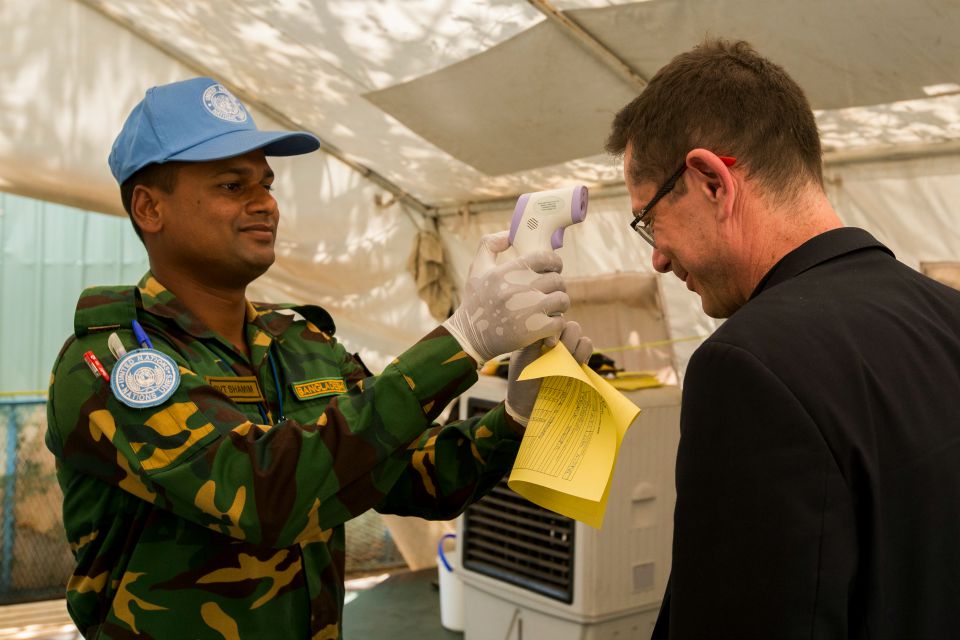"We can be proud that the international community rallied to support the efforts to defeat Ebola."
Statement by Ambassador Peter Wilson of the UK Mission to the UN at the UN Security Council Briefing on Ebola

Thank you, Madam President, for convening this important meeting, for keeping this on the agenda and in particular for the way that Nigeria responded to the challenge of Ebola within your own borders but also for the leadership that you showed in providing help to so many others.
I welcome the briefings from Director-General Chan, thank you for beaming in from Hong Kong, Special Envoy Nabarro, Mr Antonio and Dr Fallah who spoke so movingly about determination of communities to survive.
I want to express my thanks to Dr Nabarro for his tireless work in coordinating the international Ebola response, and also to Dr Chan for her leadership of the World Health Organisation. I welcome her commitment to better equip the organisation for future responses. And as others have said, all of us have a great deal to learn from what happened this last time. Dr Fallah, I particularly want to pay tribute to your bravery and the power of civil society that you represent in combating this disease.
The African Union has made a significant contribution to the fight against Ebola. All 835 African health workers deployed by the African Union, including the 190 Nigerians who volunteered as part of this effort, are testimony to the region’s commitment to defeating Ebola.
Madam President,
In September last year, the US Centres for Disease Control predicted that up to 1.4 million cases of Ebola could emerge in West Africa by early 2015 - a clear threat to international peace and security. It is important to remember, it was a real risk. But today the number of cases stands at just over 27,000. The Ebola epidemic has been brought under control. This Council usually discusses bad news. Today we should take a moment to mark this progress and make steps to ensure that it lasts.
Curbing the spread of this terrible disease has required hard work and sacrifice, in particular from local people in affected areas, but also national governments in Sierra Leone, Liberia and Guinea, and healthcare workers from across the entire world. Tragically, over 11,000 people have died. That number would have been far greater without their dedication.
We can be proud that the international community rallied to support the efforts to defeat Ebola. The United Kingdom played its part. In Sierra Leone, we committed over $660 million; built six treatment centres and three diagnostic laboratories, and with the expertise of both our military and civilians supported a command and control function which made both the national and district responses more effective. In total, over 1,300 military and healthcare workers deployed to support the response. Throughout the crisis we responded pace, ambition and innovation, working with many many others, including China, Cuba, Denmark, Sweden, New Zealand and Australia.
Our collective efforts are working. From a peak of over 500 new cases per week in Sierra Leone, we saw only one last week. But that is still one too many. The international community must remain committed to the region and to getting to zero. As the recent cases in Liberia show, even when a country has reached zero, we cannot drop our guard.
To get to zero, and stay there, we must maintain our resolve and our support. The affected countries are rightly taking steps to transition out of crisis and into recovery. Helping millions of children back to school; restoring basic healthcare services; kick-starting economic activity – that all requires the backing of everybody here. We thank the Secretary-General for holding the remarkably successful International Conference on Recovery in July. It will be important for donors to work closely with both the affected countries and with each other to best coordinate activities for the benefit of the region.
The United Kingdom will continue to stand by Sierra Leone and the region. We have pledged $370 million in support of President Koroma’s TWO-year Ebola Recovery Strategy and our commitment to Ebola recovery, including debt relief through the IMF, is now over half a billion dollars.
Madam President,
Collectively, we must learn the lessons from this crisis to improve international and national health systems. We therefore welcome the work that is being carried out by the Secretary-General’s High Level Panel on Global Response to Health Crises.
What we need to achieve is clear. Three things: First, WHO reform at headquarters, regional and country levels is needed for it to properly coordinate and lead responses to humanitarian and health crises.
Second, we need more investment in prevention and preparedness, so that national health systems have the early warning triggers and safe, affordable technologies to allow them to respond quickly and effectively to future outbreaks.
And thirdly, we need swifter rapid response mechanisms, with stronger links between the health and humanitarian sectors so that they are able to respond to health emergencies in a coordinated way.
The response in Sierra Leone showed us the effectiveness of a joined-up, cross government and multi-national approach, which allowed us to rapidly design and deliver an emergency response. What Sierra Leone Permanent Representative Vandi Chidi Minah calls more vividly “a complete jigsaw of a response”. All of this in very close partnership with the government of Sierra Leone and it was only made possible by the strong leadership of President Koroma.
Madam President,
We can’t wipe out the suffering this disease has inflicted, but we can commit clearly today to reaching zero and we must prepare deliberately and effectively both to prevent and tackle disease outbreaks in the future.
Thank you.